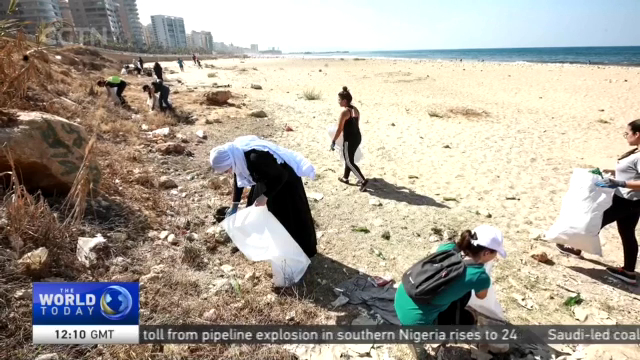
20:36, 14-Oct-2018
Lebanon Pollution: Country approves controversial law allowing burning of waste
Updated
19:50, 17-Oct-2018
02:56

In Lebanon, the parliament has approved a solid waste management law that allows the burning of garbage. Many people fear the move will lead to environmental pollution and have disastrous consequences on the nation. Our reporter Youmna Naufal has more.
Lebanon's waste crisis is once again in the headlines.
It is not a new occurrence coming to a peak in 2015 when landfills and dumpsites, labelled "Garbage Mountains", ran beyond their capacity and expiration date.
Protests broke out in the streets of Beirut lined up in rubbish demanding the government find an immediate solution. Although the situation was contained, it was not resolved and more landfills were opened to receive Lebanon's garbage. Today, residents and Environmentalists accuse officials of failing to reach a sustainable solution that would keep the public from health harm.
ZIAD ABI CHAKER ENVIRONMENTALIST "It started in the early 1990s and the people in charge then are still in charge today. When the issue exploded a few years ago with the overflow of the landfill, the government found themselves without a plan b."
A Human Rights Watch report released in December 2017 warned that more than 150 dumps of trash were burnt every year in Lebanon. The report claims that heightens the risk of cancer stemming from possible respiratory illnesses.
SAMAR KHALIL, ENVIRONMENTAL MANAGEMENT SPECIALIST AMERICAN UNIVERSITY OF BEIRUT "The cancer rates for Lebanon and are scary. The politicians know the numbers but they don't care, it's not their priority. The money they're gonna make is more important than the overall health. They don't understand we are all in the same boat."
A government official recently stated that incineration is the best way to go as it cost-effective, acknowledging the opposing arguments on the matter. With no alternatives in sight, Beirut could risk "having garbage fill up in the streets" again.
Frustrated with years of ongoing waste mismanagement, young activists have taken it upon themselves to organize waste cleanups across the country.
ALINE CHIRINIAN, LEADER WORLD CLEAN UP DAY LEBANON "This change needs to come from us, and then we can pressure our government to fix our country. At the end, they're civil servants and they need to fix our country."
YOUMNA NAUFAL BEIRUT "Beirut's municipality is moving forward with its project of implementing waste-to-energy plants, which includes incinerators in coordination with the United Nations Development Program, a solution they say has been successful in Europe and elsewhere abroad. Despite ongoing pressure from residents and social movements that it is detrimental to citizen's health, could Lebanon be headed to a burning ground? Only time will tell. Youmna Naufal, CGTN Beirut."

SITEMAP
Copyright © 2018 CGTN. Beijing ICP prepared NO.16065310-3
Copyright © 2018 CGTN. Beijing ICP prepared NO.16065310-3